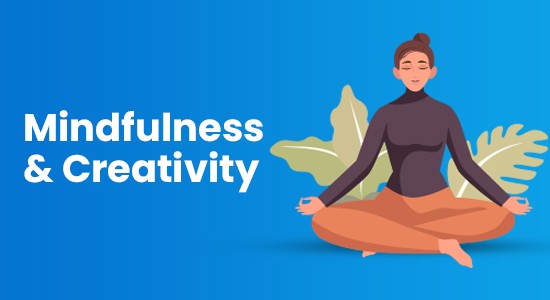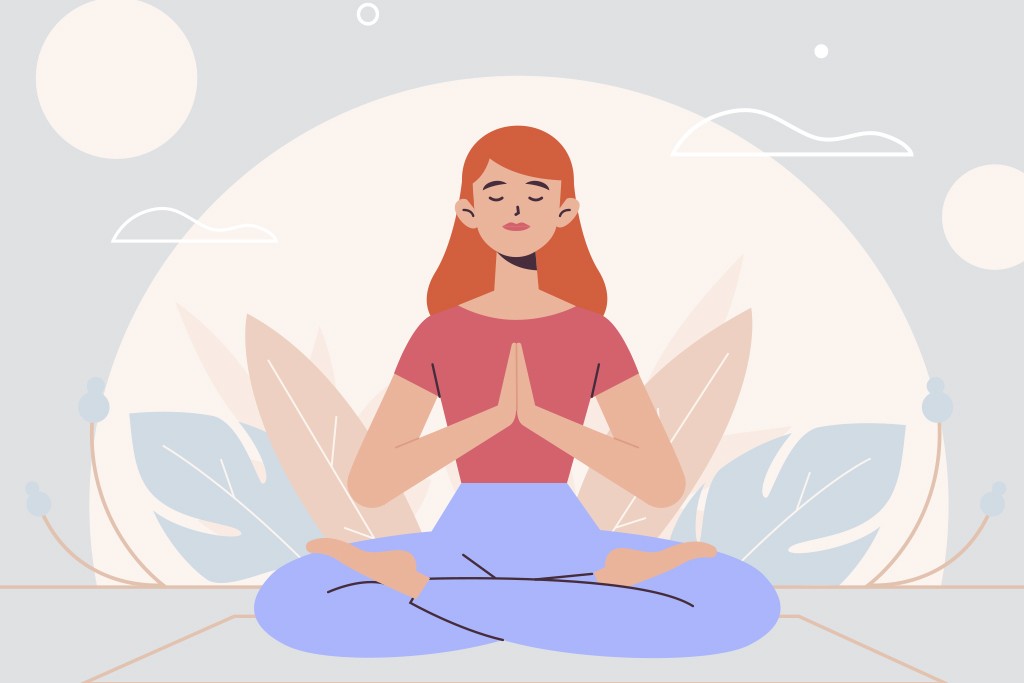Mindfulness & creativity
Mindfulness & creativity
Mindfulness is awareness, emerging by paying attention on purpose, to the present moment, and non-judgmentally to the unfolding of an experience – moment-to-moment. Becoming aware of how one is feeling right now. It could be noticing our inner thoughts, emotions, senses, or actions such as walking & playing badminton. Mindfulness is not a foreign element. We become mindful several times, right from getting caught up in the mesmerizing beauty of sunrise and sunset or when our attention repeatedly focuses on an aching tooth on every movement of our jaw.

There are three components of Mindfulness: Intention, Attention, and attitude of being present (with openness & non-judgmental compassion. It is important to set the intention to be present as fully as possible. “Paying attention” to attention in a particular way or being present with openness (being curious,) & acceptance (simply, noticing thoughts, emotions, and physical states without any criticism or judgment about experiences). Mindfulness requires us to see the world through beginner’s mind with a childlike curiosity, not seeing the world through the lens of our apprehensions & imagination, through our experiences, seeing it afresh and new. Since mindfulness helps us to see such judgements/self-criticisms from a distant perspective. We thus see the bigger picture. With this attitude we end up doing what is effective. Mindfulness & meditation are often used synonymously but meditation refers to a stationary formal practice – when you set a special time to be with yourself mindfully. Mindfulness is an umbrella term for an informal & formal set of practices to become aware of what’s going in & around us in the present moment”. I can’t keep my mind from wandering” This is the most common misconception about mindfulness. While mindfulness results in reduced mind wandering, mindfulness aims to simply observe things nonjudgmentally (breath, object, any activity, any experience, and internal thoughts). Whenever our attention drifts, gently bring back your attention to the initial practice. The aim is never to suppress our thoughts rather it is to notice such thoughts & simply bring back our attention. Mindfulness fosters a perfect mental environment that is conducive to creative thinking:
- Reduced Stress: Mindfulness practices, such as meditation and deep breathing, can reduce stress and anxiety. When we are less stressed, our mind is more open to creative ideas, and we are better able to focus on tasks at hand.
- Improved Focus: Mindfulness can enhance your ability to concentrate on the present. This heightened focus can help you immerse yourself in creative tasks without distraction.
- Open-Mindedness: Mindfulness promotes an open and non-judgmental attitude toward our experiences, allowing us to explore unconventional ideas and perspectives.
- Increased Self-Awareness & Improved Emotional Regulation: Mindfulness encourages self-reflection and self-awareness leading to a deeper understanding of one’s strengths, and weaknesses, enabling us to make more informed creative decisions, Creative endeavors often involve dealing with frustration, self-doubt, and setbacks. Being better equipped to manage these emotions can help us to persevere through creative challenges.
- Enhanced Problem Solving & Improved Working Memory: By cultivating a calm and focused mind, you’re better equipped to come up with novel solutions. Working memory is a key component of creativity, and mindfulness training can enhance it. Experienced meditators in particular are more verbally creative and better at solving problems.
- Improved Adaptability: Increased Adaptability: This enhances a person’s potential to react to circumstances in a non-habitual way (outside of default mode), which is essential for creativity.
Studies have shown that even brief mindfulness breaks can enhance creativity.

One must consider practicing mindfulness meditation, deep breathing exercises, or simply being more present and attentive in daily activities. Mindfulness is also like a marathon. But we consider it a fluke if we don’t get results instantly. “I have meditated for 20 minutes and I still feel awful”. We often give this excuse without realizing that our brain changes with daily practice & these connections need to be consolidated via daily practice. Over time, we may find that our creative thinking becomes more flexible, spontaneous, and innovative as a result of mindfulness practice.


